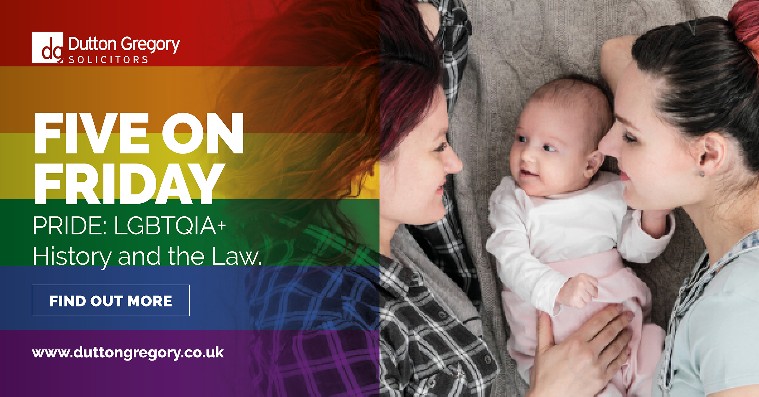June is international Pride month, a celebration of LGBTQIA+ communities all over the world that not only remembers those who have fought for equality, but continues to highlight the injustice and damage caused by discrimination based on sexual orientation and identity. To mark this month, here are our Top Five Facts on LGBTQIA+ history and the law.
1. “I’m not missing a minute of this. It’s the revolution!” – Sylvia Rivera
Pride finds its roots in New York with the first demonstrations, known as the Stonewall Riots, taking place between 28th June 1969 – 3rd July 1969. The demonstrations were in response to ongoing police brutality against members of the LGBT community and to this day they signify a pivotal moment for members of the community in the fight for equality and liberation. Since then, Pride marches have taken place across the globe and attract millions of people each year to celebrate.
2. The Law Against Love
The Buggery Act 1533 is the earliest traceable law which targeted male homosexuality in the UK with prosecution for an offence carrying the death penalty. Though society has changed a great deal since 1533, it wasn’t until 1967 that the Sexual Offences Act (partially) legalised same-sex relations between men over the age of 21 conducted in private.
3. “To realize a world of equality and dignity for all, we will have to change laws and policies; we will also have to change hearts and minds.” – Rick Parnell
Following Stonewall, the Gay Liberation Front (“GLF”) was founded in the UK in 1970 to empower LGBT people to push for change. The GLF organised the very first British Pride march in 1972. Ultimately, the organisation disbanded in 1973 and the Campaign for Homosexual Equality became its replacement.
In 2010 LGBT employees received recognition through the enactment of the Equality Act which offers protection from discrimination, harassment and victimisation at work, and in 2014, the Marriage (Same Sex Couples) Act 2013 came into effect, legalising gay marriage in England and Wales.
4. “Openness may not completely disarm prejudice, but it’s a good place to start.” – Jason Collins
In 1988, the amendment of Section 28 of the Local Government Act 1986 by Parliament prohibited local authorities from ‘intentionally promoting homosexuality’ or ‘teaching in any maintained school of the acceptability of homosexuality as a pretended family relationship’. Despite widespread public criticism, Section 28 was not repealed until 2003.
5. Looking to the Future
It is clear that much has changed in recent years to encourage inclusivity and diversity in society, and the law is beginning to catch up. The Gender Recognition Act 2004 came into effect in 2005 and gave trans people full legal recognition of their gender. However, the Act limits gender options to ‘male’ or ‘female’ something which the Government has recently consulted the public on amending, the outcomes of which are yet to be published.
We look forward to seeing the ways in which the law will continue to develop in order to support and facilitate a diverse and accepting society in the years to come.
Should you wish to discuss a marriage, civil partnership, discrimination claim or need advice on any other matter, Dutton Gregory is here to help. If you wish to speak to a member of our team in complete confidence, write to contact@duttongregory.co.uk or call your nearest office.







